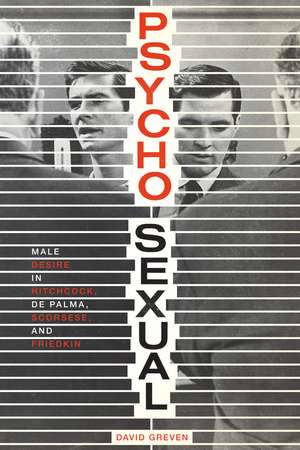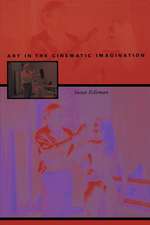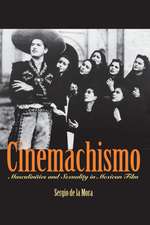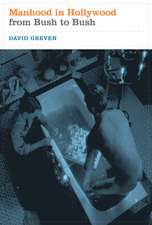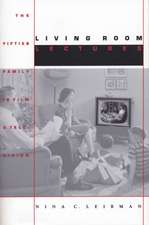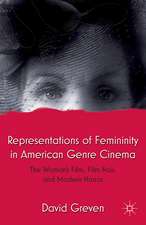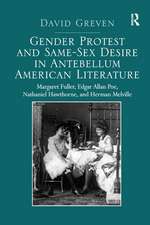Psycho-Sexual: Male Desire in Hitchcock, De Palma, Scorsese, and Friedkin
Autor David Grevenen Limba Engleză Paperback – 2013
Psycho-Sexual probes De Palma’s early Vietnam War draft-dodger comedies as well as his film Dressed to Kill, along with Scorsese’s Taxi Driver and Friedkin’s Cruising as reactions to and inventive elaborations upon Hitchcock’s gendered themes and aesthetic approaches. Greven demonstrates how the significant political achievement of these films arises from a deeply disturbing, violent, even sorrowful psychological and social context. Engaging with contemporary theories of pornography while establishing pornography’s emergence during the classical Hollywood era, Greven argues that New Hollywood filmmakers seized upon Hitchcock’s radical decentering of heterosexual male dominance. The resulting images of heterosexual male ambivalence allowed for an investment in same-sex desire; an aura of homophobia became informed by a fascination with the homoerotic. Psycho-Sexual also explores the broader gender crisis and disorganization that permeated the Cold War and New Hollywood eras, reimagining the defining premises of Hitchcock criticism.
Preț: 240.80 lei
Nou
Puncte Express: 361
Preț estimativ în valută:
46.08€ • 48.23$ • 38.35£
46.08€ • 48.23$ • 38.35£
Carte tipărită la comandă
Livrare economică 31 martie-14 aprilie
Preluare comenzi: 021 569.72.76
Specificații
ISBN-13: 9780292756762
ISBN-10: 0292756763
Pagini: 311
Dimensiuni: 152 x 229 x 20 mm
Greutate: 0.46 kg
Editura: University of Texas Press
Colecția University of Texas Press
ISBN-10: 0292756763
Pagini: 311
Dimensiuni: 152 x 229 x 20 mm
Greutate: 0.46 kg
Editura: University of Texas Press
Colecția University of Texas Press
Notă biografică
David Greven is Associate Professor of English at the University of South Carolina. His previous books include Representations of Femininity in American Genre Cinema, Manhood in Hollywood from Bush to Bush, and Men Beyond Desire.
Cuprins
- Acknowledgments
- Introduction. Hitchcock, Gender, and the New Hollywood
- Chapter One. Cruising, Hysteria, Knowledge: The Man Who Knew Too Much (1956)
- Chapter Two. "You Are Alone Here, Aren't You?": Psycho's Doubles
- Chapter Three. Blank Screens: Psycho and the Pornographic Gaze
- Chapter Four. Misfortune and Men's Eyes: Three Early De Palma Comedies
- Chapter Five. A Sense of Vertigo: Taxi Driver
- Chapter Six. Mirror Shades: Cruising
- Chapter Seven. The Gender Museum: Dressed to Kill
- Coda: Ideology at an Impasse
- Notes
- Bibliography
- Index
Recenzii
By placing text before theory, Greven's labored, good-faith book stands higher than merely auteur appreciation: It demands serious consideration across many disciplinary planes, both historic and theoretical, as an exemplary, immanently readable call for serious, revisionist film-studies texts, while serving as one itself.
Greven takes a sustained look at the psychosexual dynamics of masculine desire found in two generations of American filmmakers...The author's nuanced readings suggest how profoundly Hitchcock influenced his successors...Summing Up: Recommended.
Like the best critical studies, Greven incisively cuts (or, with these particular films, slashes) in multiple directions at once: gender studies (masculinity as well as feminism); queer studies; (adeptly revised) psychoanalytic film theories; and historical context, all supported by close readings that deftly defamiliarize much discussed work (like Psycho, Taxi Driver, and Cruising) while also satisfyingly exhuming neglected others (e.g., De Palma's early comedies.
Anyone interested in intelligent, insightful film criticism will find much to admire in the close analysis on display here.
Descriere
Examining the intertextual reverberations between canonical Hitchcock films and the New Hollywood of the 1970s, this revisionist reading challenges the received opinion of misogyny, racism, and homophobia presented in male desire featured in works by Hitc
